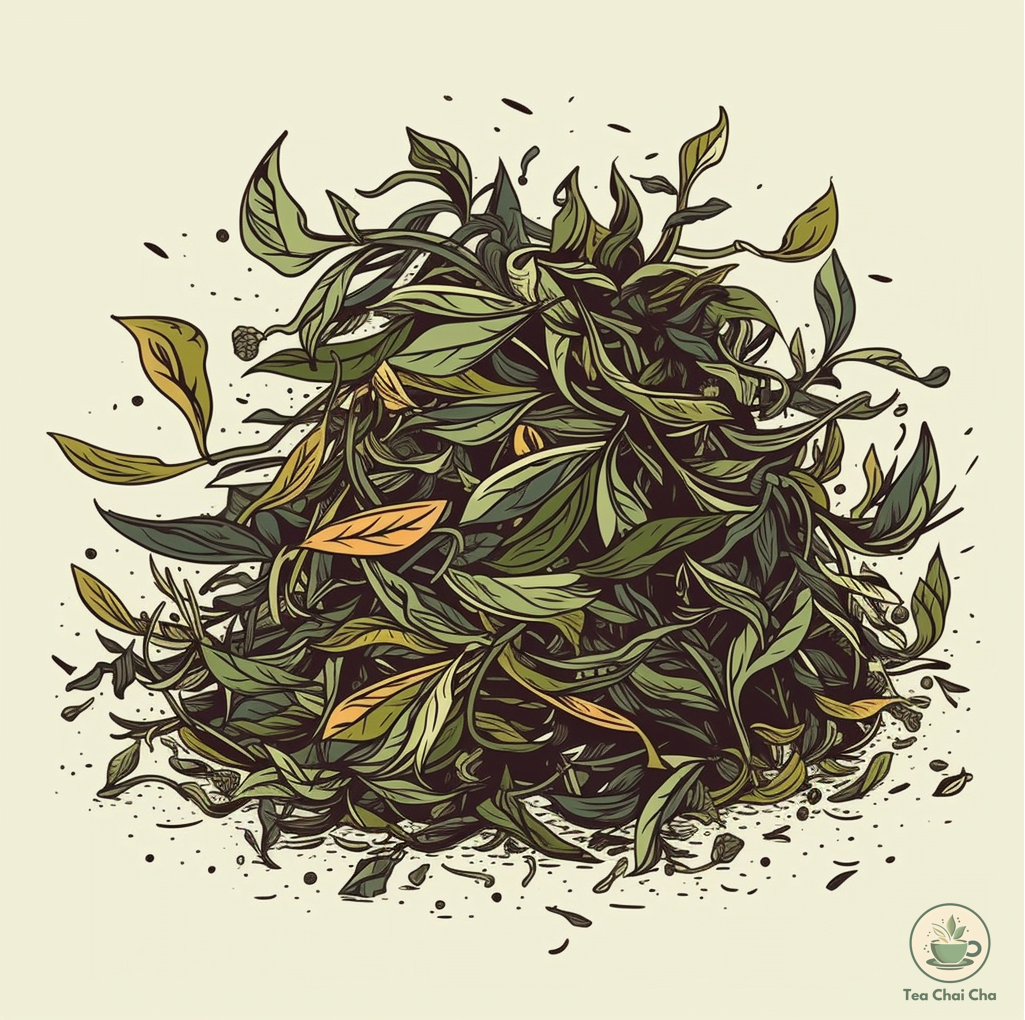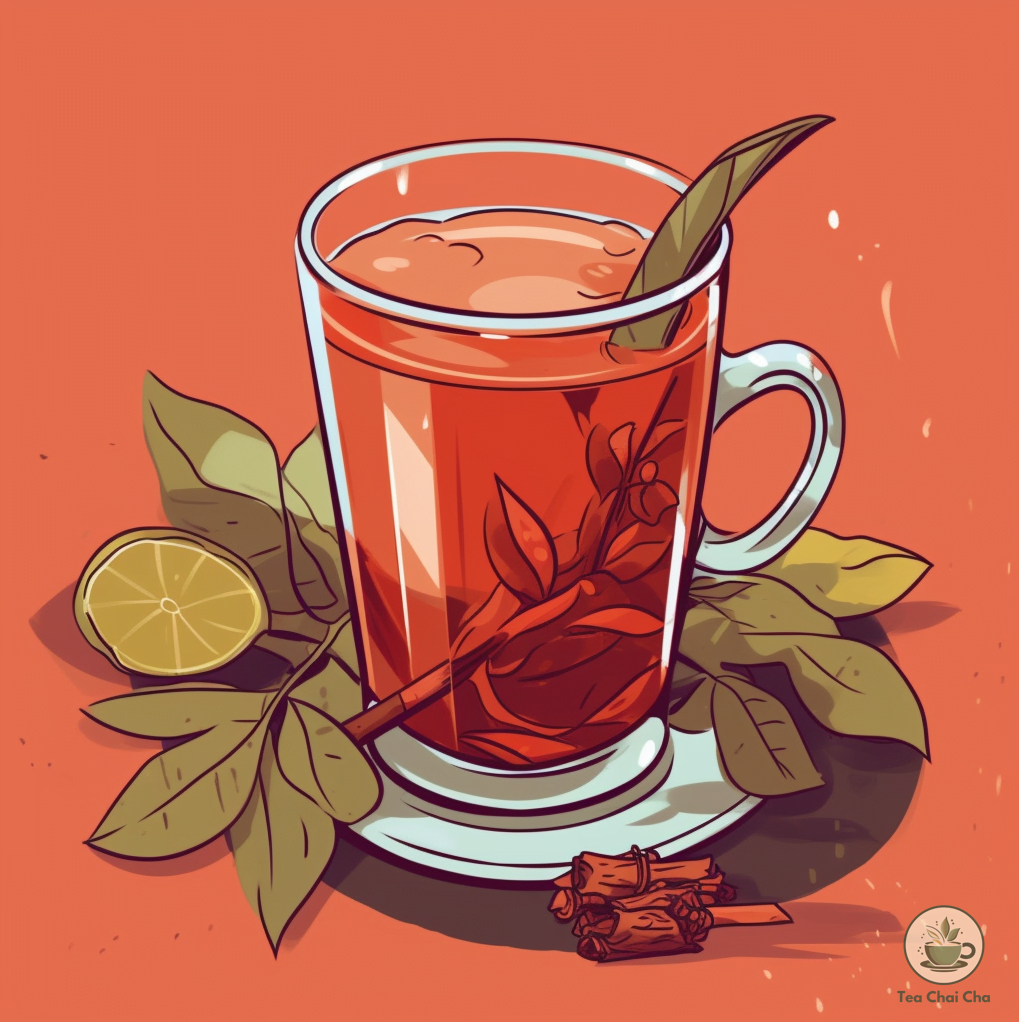Are you curious about the caffeine content in Turkish tea?
Well, I was too.
Turkish tea, known for its rich flavor and cultural significance, has always been a favorite of mine.
But what about that caffeine kick?
Is it as potent as it tastes?
Served in 4.25 oz tiny glasses, it’s an invitation to sit down, relax, and enjoy the moment.
But, what’s often overlooked is its caffeine content.
Turkish tea has approximately 100 mg of caffeine in a 6-ounce cup and 71 mg of caffeine in a traditional 4.25-ounce Ince Belli teacup or çay bardağı.
That’s a pretty respectable amount, comparable to your regular coffee.
But that’s not it!
You might want to know how to lower this caffeine content in your Turkish tea or where this much caffeine comes from in the first-place.
Keep scrolling for it!

What Is Turkish Tea?
Turkish tea, known as “Çay,” (pronounced as Chai) is a special black tea deeply ingrained in Turkish culture.
It’s not just any tea; it’s a way of life.
The tea leaves come from the Rize province in Turkey, which gives it a unique flavor.
In Turkey, tea is more than just a drink; it’s a social experience.
Everywhere you go, whether it’s a street, shop, home, or park, someone will offer you tea.
It’s a gesture of hospitality and warmth that’s hard to resist.
The love for tea runs deep in Turkey.
In fact, in 2016, Turkey topped the charts for tea consumption, with an average of 6.96 pounds of tea consumed per person.
That’s a lot of tea!
But it’s not just about the quantity; it’s about the ritual.
Turkish tea is typically served in small, tulip-shaped glasses.
The tea is strong and dark, often accompanied by sugar cubes or a slice of lemon.
You take small sips, savoring the rich flavor while engaging in conversation with friends or strangers.
History of Turkish Tea
The tea industry in Turkey is relatively young, with its beginnings around 1917 when people started growing tea plants in the Rize province.
Back in 1924, the government put in place laws and rules to regulate this industry.
It wasn’t until 1947 that the country’s first tea processing plant opened its doors.
And since then, it has expanded not only in Rize but also in places like Giresun, Ordu, Artvin, and Trabzon.
While Turkey’s tea history may not be as long and storied as China’s or England’s, Turks take the tea trade quite seriously there.

What Is Turkish Tea Made Of
Turkish tea is a bold, black tea brewed from the Camellia sinensis plant.
It’s all about that Turkish-grown Ceylon tea from Rize, Turkey.
The choice of Ceylon tea gives it a mellow vibe that’s just perfect.
Turkish tea is the real deal, no frills.
Turks like it pure, no cream or milk here.
They’re all about savoring that boldness, both in taste and appearance.
It’s a simple pleasure – just a cup of Turkish tea with maybe a cube of beet sugar.
That’s all you need to enjoy this delightful brew.
Besides, the way Turkish tea is made is quite different from the usual tea you might be familiar with.
Instead of using tea bags, loose tea leaves are brewed in a two-tiered pot called a “çaydanlık.”
The lower pot holds boiling water, while the upper one has the tea leaves.
When it’s ready, the tea is poured into a small tulip-shaped glass.
What’s interesting is that the tea is usually very strong, but it’s diluted to your liking with hot water.
So, you can make it as strong or as mild as you prefer.
It’s often served with sugar, but you can also enjoy it without any sweetener.
What Is Special about Turkish Tea?
What makes Turkish tea special in Turkey is not just the tea itself but how it’s enjoyed.
Unlike in England, there’s no fixed “tea time” in Turkey; tea is sipped from morning till night, no matter where you are or who you’re with.
It’s not about the tea; it’s about the experience.
In Turkey, offering tea is a symbol of friendship and inclusion.
It’s the heart of sharing, great conversations, and connecting with others.
When you have a cup of Turkish tea, expect to be surrounded by people eager to chat, and there’s no room for shyness.

Turkey’s Tea Etiquette
In Turkey, when you’re offered tea, it’s a must to accept it; refusing is considered rude.
To signal that you’ve had enough, simply place your spoon across the top of your glass, saying, “Thank you, but no more.”
Turkish tea is meant to be savored, not chugged, and it’s always served without milk.
When you receive your tea, you’ll find a cube of beet sugar on the saucer.
Pop it in your mouth, and as you sip the tea, it sweetens the experience.
What’s interesting is you don’t pour ready-made tea into your cup.
Instead, you choose how strong you want it.
Then, they pour concentrated tea from a teapot into your glass to your desired strength, followed by hot water.
Turkish Tea Ratio
- “Very Strong” Turkish tea: Half a glass of tea concentrate mixed with half a glass of water.
- “Normal” Turkish tea: ¼ a glass of tea concentrate mixed with ¾ a glass of water.
- “Lite” Turkish tea: Less than ¼ of the tea concentrate with more water for a milder taste.
Teaware for Turkish Tea
The Turkish teapot, called a Çaydanlık, is quite unique.
It’s a two-part system with one teapot sitting right on top of the other.
The bottom teapot is bigger and holds just water.
The top one, smaller in size, is used to brew strong tea.
When you make Turkish tea, you pour the concentrated tea from the top teapot into a small, elegant glass teacup (Ince Belli or çay bardağı), often without handles.
These teacups are delicate, made of thin glass, and often have fancy gold rims.
They have a lovely tulip shape, and their transparency lets me enjoy the beautiful color of the tea.
The small size of these teacups is intentional.
It ensures that the tea stays hot while you enjoy it.
Bigger cups tend to cool down faster, and that’s not what you want when sipping your hot, flavorful Turkish tea.
Don’t Forget Narghile
In Turkey, when people gather for tea, you’ll often find the narghile, also known as a hookah, right at the center.
It’s like the life of the party, and everyone’s invited to join in.
The narghile is a water pipe, and it’s not just for decoration; it’s there to be shared and enjoyed.
Picture a big, beautiful vessel filled with water, and it’s being heated up.
Now, instead of sipping tea, you’re inhaling something different – either tobacco or charcoal.
You don’t do this alone; there are plenty of hose extensions so everyone can have a go.
It’s a social thing, a tradition that’s deeply rooted in Middle Eastern culture.

Does Turkish Tea Have Caffeine?
Turkish tea isn’t caffeine-free, as some websites might claim.
It’s actually quite caffeinated because it’s made from black tea.
And black tea is known to have caffeine.
In fact, a study by chemists found that Turkish black tea contains about 4% caffeine, while green tea has around 3.13% caffeine.
If you make a regular-sized cup of Turkish tea using the typical water-to-tea ratio most people use, you’ll end up with a 6-ounce cup of tea that packs about 100 milligrams of caffeine.
Besides, a standard 4.25 oz. cup of Turkish tea contains 71 mg caffeine.
Note that the FDA recommends consuming 400 milligrams or less of caffeine per day.
Tidbit!
You can drink 5 (4.25 oz.) cups of Turkish tea in a day and still follow the FDA caffeine consumption guideline!
Brewing Turkish tea is pretty different from the regular brewing.
- Standard brewing: 2-3 grams (½ tsp.) tea to 6 oz. of water
- Turkish tea brewing: 68 grams (12 tsp.) tea to 16 oz. of water (it makes 1.33 tsp. of tea per oz. of water)
To make it digestible, lemme put it like this
Turkish Tea Cup Size: 4.25 oz
Caffeine Content in Standard Black Tea: 4% (16.70 mg caffeine per ounce)
Water/Tea Ratio for Turkish Tea: 1.33 tsp. of tea per ounce of water
So, it means the caffeine content in Turkish tea changes as you change the tea-to-water ratio.
16.70 mg caffeine per ounce x 4.25 ounce cup = 70.975 mg caffeine per 4.25 ounce cup
Expect this much caffeine in your Turkish tea:
| Preparation Method | Tea Concentration | Caffeine Content (per 4.25 oz cup) |
|---|---|---|
| Very Strong | Half tea, half water | Approximately 71 mg |
| Normal | 1/4 tea, 3/4 water | Approximately 35.5 mg |
| Lite | Less than 1/4 tea, more water | Less than 35.5 mg |
Turkish Tea Caffeine vs Coffee
When you make a 4.25 ounce cup of Turkish tea, you’re getting about ~71 milligrams of caffeine.
But if you go for a slightly bigger 6 ounce cup, it has around 100 milligrams of caffeine.
Now, let’s compare it to coffee.
Caffeine in Turkish tea is roughly half of what you’d find in a half cup of coffee, clocking in at around 95 mg of caffeine.
A regular 8 oz. cup of coffee usually has more caffeine than a 4.25 oz. cup of Turkish tea.
So, it’s definitely milder in the caffeine department compared to coffee.
However, 8 oz. cup of Turkish tea has 133 mg of caffeine while 8 oz. cup of coffee has only 95 mg caffeine.
So, Turkish tea has 1.4 times more caffeine than coffee given the same volume.
Besides, Turkish tea is often served in smaller glasses than coffee mugs.
That means you might have more than one serving of tea in a day.
If you add up those smaller (4.25 oz.) servings, your total caffeine intake could end up being more than to what you’d get from coffee.
So, even though Turkish tea starts with less caffeine in each cup, it can still give you a nice energy boost and keep you alert, especially if you enjoy multiple rounds of tea throughout the day.
Turkish Tea vs Turkish Coffee
| Beverage | Turkish Tea | Turkish Coffee |
|---|---|---|
| Caffeine Content | Approximately 71 mg per 4.25 oz. | 50 to 65 mg per 2.5 oz. |
| Flavor Profile | Mild and earthy | Bold and rich |
| Serving Size | Small tea cups | Small coffee cups |
| Preparation | Infused in hot water | Finely ground and brewed |
| Ritual | Sipping conversations | Quick caffeine jolt |
| Best For | Leisurely chats and calm | Wake-up calls and intense sips |
Turkish tea has about 71 mg of caffeine per 4.25 oz. cup.
On the other hand, a standard Turkish coffee cup is pretty petite, holding about 2 to 2.5 fluid ounces (60 to 75 milliliters) of coffee.
But don’t let its size fool you!
It’s a caffeine powerhouse.
On average, each of these small but mighty Turkish coffee cups contains roughly 50 to 65 mg of caffeine.
However, in some cases, it can dip as low as 40 mg.
So, Turkish coffee is roughly 92% as strong as Turkish tea in terms of caffeine content (given standard cups.)

5 Factors Affecting the Caffeine in Turkish Tea
Turkish tea is a delightful beverage with a rich history and a unique brewing process.
One aspect that often sparks curiosity is its caffeine content.
Let’s explore the factors that influence the caffeine levels in Turkish tea.
1. Tea Concentration Matters
The strength of your Turkish tea depends on how much tea leaves you use in relation to the water.
If you prefer a very strong cup, you’ll use more tea leaves, resulting in a higher caffeine content.
Conversely, a milder brew will have less caffeine.
2. Cup Size Counts
The size of your Turkish tea cup matters too.
Traditional Turkish tea glasses typically hold about 4.25 ounces (125 ml).
The caffeine content is concentrated within this smaller volume.
So, even though each cup may have less caffeine compared to a larger cup, if you have multiple servings, your total caffeine intake can add up.
3. Tea Leaf Type
Turkish tea is typically made from black tea leaves.
Black tea generally contains more caffeine than green or herbal teas.
This choice of tea type contributes to the caffeine content of Turkish tea.
4. Brewing Time
The duration you steep your Turkish tea affects its caffeine strength.
A longer steeping time allows more caffeine to be extracted from the tea leaves, resulting in a stronger cup.
Adjusting the steeping time can help you control the caffeine levels to your liking.
5. Water-to-Tea Ratio
The precise ratio of tea leaves to water is a defining characteristic of Turkish tea.
This ratio is about 1.33 teaspoons of tea per ounce of water.
It’s crucial to maintain this balance for the authentic Turkish tea experience, including its caffeine content.
6 Tips for Reducing Caffeine in Turkish Tea
Turkish tea is known for its robust flavor and caffeine kick, but what if you’re looking for a milder cup?
Here are some tips to help you reduce the caffeine content in your Turkish tea while still enjoying its rich taste:
1. Adjust the Tea-to-Water Ratio
To reduce caffeine, use fewer tea leaves when brewing.
Opt for a “Lite” Turkish tea by using less than 1/4 teaspoon of tea per ounce of water.
This will result in a milder cup.
2. Dilute Your Tea
After brewing, you can further dilute your tea with hot water.
Adding more hot water to your cup will lower the overall caffeine concentration.
3. Choose Herbal Alternatives
If you’re particularly sensitive to caffeine, consider herbal teas or infusions as an alternative to traditional Turkish tea.
These are naturally caffeine-free and can provide a soothing experience.
4. Opt for Decaffeinated Black Tea
Look for decaffeinated black tea options if you want the flavor of Turkish tea without the caffeine.
These teas undergo a process to remove most of the caffeine content.
5. Use Smaller Glasses
Enjoying Turkish tea in smaller glasses will naturally limit your caffeine intake per serving if you make a Lite version of Turkish tea.
Stick to the traditional 4.25-ounce teacups for a balanced experience.
6. Time Your Tea
Brew your Turkish tea for a shorter duration to extract less caffeine.
Steeping for a shorter time will result in a milder cup.
Does Turkish Tea Make You Sleepy?
Turkish tea, with its bold flavor and caffeine punch, can give you an energy boost.
But does it make you sleepy? Not really.
In fact, Turkish tea is more likely to keep you awake and alert, thanks to its caffeine content.
So, if you’re sipping Turkish tea before bedtime, be prepared for a potential delay in your bedtime plans.
But hey, that’s what makes it a great choice for a morning or afternoon pick-me-up.
It’s like a shot of energy in a tiny glass, perfect for lively conversations and staying wide awake during the day.
Can You Drink Turkish Tea at Night?
Drinking Turkish tea at night?
Well, you can, but it might not be the best idea.
Why?
Because that delightful Turkish tea packs a caffeine punch, about 71 mg in a 4.25 ounce cup, to be precise.
Caffeine is a natural stimulant, and it can mess with your sleep if consumed too close to bedtime.
So, if you’re planning on catching those Z’s, it’s probably wise to skip the Turkish tea at night and opt for something caffeine-free to ensure a peaceful night’s sleep.
Caffeine in Other Teas
Frequently Asked Questions (FAQs)
Can we add milk in Turkish tea?
Traditional Turkish tea is typically enjoyed without milk. It’s served plain or with sugar, but milk is not a common addition.
Does Turkish tea have a lot of caffeine?
Turkish tea contains a moderate amount of caffeine, about 71 mg per 4.25 ounce cup.
It’s less caffeine compared to an 8 oz. cup of coffee but enough to give you a nice energy boost.
But, 8 oz. cup of Turkish tea has 133 mg of caffeine while 8 oz. cup of coffee has only 95 mg caffeine.
So, Turkish tea has 1.4 times more caffeine than coffee given the same volume.
Do Turkish people drink more tea or coffee?
Turkish people are known for their love of tea.
Tea, particularly Turkish tea, is a staple beverage in their culture and is consumed more frequently than coffee.
Tea is often served throughout the day, while coffee is enjoyed but not as commonly as tea.
